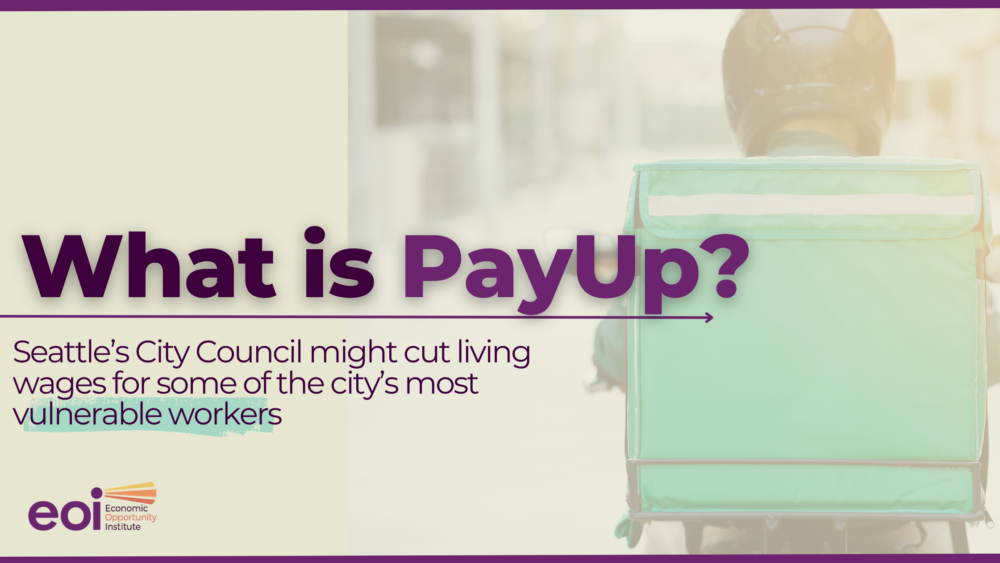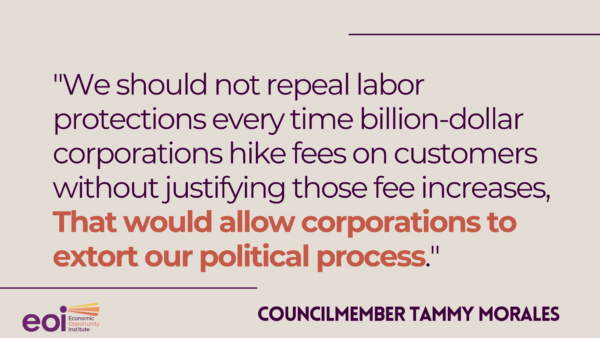
In January, Seattle implemented a new wage standard to ensure fair compensation for app-based delivery workers. This new policy, also known as the PayUp ordinance, guarantees gig workers a number of much-needed benefits and protections. Most notably, it requires delivery apps like DoorDash, Uber, and Instacart to pay workers the city’s minimum wage. In a year of landmark labor wins, PayUp’s passage was a proud moment for the city. But now, five months after PayUp’s passage, the City Council is considering rolling back these protections.
On the surface, the new ordinance proposed by city council president Sara Nelson appears to meet the city’s minimum wage of $19.97 per hour. However, by reducing mileage compensation, the proposal slashes take-home pay to a sub-minimum wage of $13.17 per hour. Additionally, the law does not consider that gig workers must cover all their taxes. After adding up the extra time and expenses, the new proposal would reduce pay to a low of $6.80 per hour. This wage is well below the federal minimum, making it extremely difficult for gig workers to cover their living expenses.
Why cut wages for the city’s most vulnerable workers?
DoorDash, Uber Eats, and Instacart argue the current law is hurting their profits. As a result, they’ve imposed new fees, passing the cost of fairly compensating workers on to consumers. The higher costs have decreased demand for gig workers and caused a drop in their wages. The restaurant industry is also suffering due to the new fees imposed by the apps. In response, the Seattle City Council has chosen to weaken the PayUp ordinance and reduce gig workers’ take-home pay rather than regulate the fees delivery companies can charge customers.
Good wages work for all of us.
Good wages are critical to self-resiliency and survival, especially in an expensive city like Seattle. After the 2015 minimum wage increase, UW faculty member Diana Pearce found the new wage reduced poverty more than any other Washington policy. According to Washington’s Self-Sufficiency Standard, a single parent supporting two young children must earn $57 an hour, and a single person $20 an hour to afford living in Seattle. By reducing wages, the City Council is putting gig workers at risk of poverty. This was evident on May 9th, when over 100 workers and advocates showed up to oppose the proposal. But, despite the powerful stories workers and families shared during testimony, the Council Governance Committee voted to advance the bill.
What’s next for Seattle delivery drivers?

The delivery ordinance is scheduled for a full vote on May 28th. With a nine-member City Council, the ordinance needs 5 NO votes to defeat the proposed legislation. Progressive members of the council have voice their opposition. Councilmember Tammy Morales warned repealing labor protections “every time billion-dollar corporations hike fees on customers without justifying those fee increases,” sets a bad precedent. But the newly elected City Council has moved to the right, and seems prepared to roll back the the ordinance despite the cost.
What’s worse is the lack of respect for Seattle voters. A recent poll shows that only 18% of voters support cutting wages for app delivery drivers. The council should listen to drivers, stakeholders, and constituents before pulling the rug out from under the city’s most vulnerable workers.
Seattle’s City Council is rushing to make a change without considering quality data and real-life experiences, the backbone of prudent policymaking. Instead, the council is in a hurry to “fix” a law that isn’t broken rather than address a system that is: fee regulation.
Get Involved
The proposal is expected to pass, but it’s not too late to take action. Let your voice be heard: Tell the Seattle City Council that a minimum wage for gig workers is good for us all!
More To Read
January 17, 2025
A look into the Department of Revenue’s Wealth Tax Study
A wealth tax can be reasonably and effectively implemented in Washington state
January 6, 2025
Initiative Measure 1 offers proven policies to fix Burien’s flawed minimum wage law
The city's current minimum wage ordinance gives with one hand while taking back with the other — but Initiative Measure 1 would fix that
September 24, 2024
Oregon and Washington: Different Tax Codes and Very Different Ballot Fights about Taxes this November
Structural differences in Oregon and Washington’s tax codes create the backdrop for very different conversations about taxes and fairness this fall
